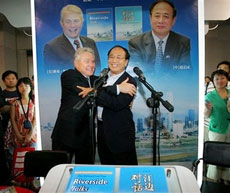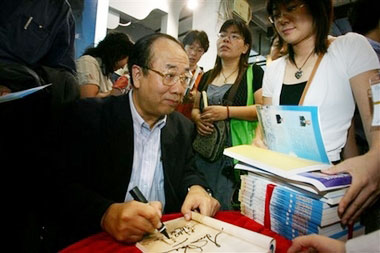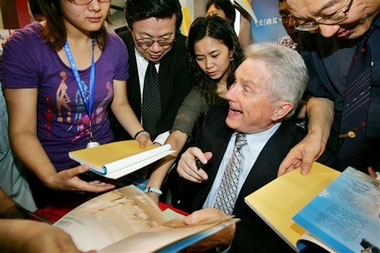One is a former spokesman for China's Cabinet, the other, an American
evangelist known for his elaborate, two-day Christian festivals. The question
they are both asking: Does God exist?
While atheist Zhao Qizheng wants proof, preacher Luis Palau's answer is a
resounding "Yes!"

Zhao Qizheng (R),
embraces American evangelist Luis Palau at a signing for their book titled
'Riverside Talks: A Friendly Dialogue Between an Atheist and a Christian.'
at a bookfair in Beijing, China Wednesday Aug. 30, 2006. [AP]
|
The two men have met privately on three occasions over the past 18 months to
debate religion and exchange ideas. The result is a book in English and Chinese
versions to be launched Wednesday in Beijing titled "Riverside Talks: A Friendly
Dialogue Between an Atheist and a Christian."
The book is in part a public relations exercise. Palau wants to reach out to
Chinese curious about religion, while Zhao is hoping to give the West a better
understanding of China's culture and beliefs.
Their different agendas also illustrate the complex picture of religion in
China today: Religions, Christianity included, are thriving as Chinese search
for answers amid tumultuous economic and social changes.
The authors, however, warmly praised each other and insisted the point of the
publication is less about politics and more about the philosophy of religion.
"The fact that two people of opposing points of view can speak clearly,
intelligently, honestly and respect each other simultaneously is a great
victory," Palau said at a news conference Tuesday.
Zhao, who stepped down
as the minister of China's State Council Information Office last year and is now
a member of a government advisory body, said it was a way for China and the
United States to have bilateral exchanges.
"The channels for communication are many and the dialogue between religion
and non-religion is one of them," said Zhao, a Communist Party member. "It will
promote the understandings between people from both sides and help people to get
to know the opinions of each other."
The pair met when Palau was visiting Beijing in May
2005. Instead of the usual pleasantries, Palau said Zhao told him he had read
the Bible three times and the two men immediately jumped into discussion.

Former
minister of China's State Council Information Office and atheist
Zhao Qizheng signs copies of the book he co-wrote with American evangelist
and preacher Luis Palau at a signing for their book titled 'Riverside
Talks: A Friendly Dialogue Between an Atheist and a Christian.' at a
bookfair in Beijing, China Wednesday Aug. 30, 2006.
[AP] |
An hour later, Palau joked about writing a book, "and that's how it started."
Two consecutive days of meetings involving eight hours of debate followed in
Shanghai in November.
For Zhao, the conversations showed "both of us have questions we can't answer
at this time."
"I asked Palau to conduct a lab experiment to show that God exists. But he
told me to have a lab test to show that God doesn't exist," he said. "Neither of
us could do it."
About 10,000 copies of the book have been printed in Chinese and another
2,000 in English to be sold at bookstores across China, said Zhou Jun, deputy
director of the distribution department of the New World Press.
In a sign of the dialogue's limits, Chinese regulations make it nearly
impossible for Palau, whose Luis Palau Association is based in Portland, Oregon,
to hold the massive, modern evangelical meetings he is known for. The two-day
events showcase Christian rock bands, extreme sports and food courts, and seek
corporate sponsorship instead of offerings.
The officially atheistic Chinese government prohibits worship outside
state-approved venues and forbids proselytizing.
At Tuesday's book launch, Palau sidestepped questions about Beijing's
religious policies.

American evangelist
Luis Palau signs copies of the book titled 'Riverside Talks: A Friendly
Dialogue Between an Atheist and a Christian.' which he co-wrote with
former spokesman for China's Cabinet and atheist Zhao Qizheng, not in
picture, at a bookfair in Beijing, China Wednesday Aug. 30,
2006. |
It's not because "we don't have opinions about it," Palau said. "But ...
let's not politicize it with details that are important but not for this
dialogue."
Zhao denied that the government repressed religion.
"It's acceptable to say we do have some problems in some regions regarding
religion," he said. "But if you say that the Chinese government has very strict
limitations on religion, that's not in accordance with fact."
For now, both Zhao and Palau have agreed to disagree. The most difficult
questions they've wrestled with are over the origins of the universe and where
God came from.
"I don't have an answer to where God came from," Palau said. "But I said to
(Zhao), when we get to heaven, we'll find out."